February 2003 Feature
The President as Commander-in-Chief Kahlil G. ChismEducation Specialist
National Archives and Records Administration
 |
| President Lyndon Johnson, with Gen. William Westmoreland, decorates a soldier in Vietnam, October 26, 1966. (Lyndon Baines Johnson Library) |
The passage of Public Law 90-363, in 1968, moved the traditional observance of George Washington's birthday from February 22 to the third Monday in February. Since Washington's birthday fell so soon after Lincoln's birthday (February 12), many states chose to combine the two events into President's Day, a day now used to honor all U.S. Presidents.
This month the National Archives and Records Administration's American Presidency lecture series focuses on a theme that pulls together documents and histories from a particular cohort of U.S. Presidents: those who have had to exercise their powers as Commander-in-Chief at the outbreak of war.
Past Presidents who have filled that role are James Madison, James Polk, Abraham Lincoln, William McKinley, Woodrow Wilson, Franklin D. Roosevelt, Harry Truman, and George W. Bush. Their duties and powers changed and expanded as they acted as Commander-in-Chief, and they all had to make a case for war to the Congress and to the American people. It is this particular aspect of the American Presidency—the expanded powers of the President acting as Commander-in-Chief—that will be discussed at length during this month's symposium "Through the Perilous Night: The American Presidency and the Coming of War" on February 12.
According to the U.S. Constitution, "The President shall be Commander-in-Chief of the Army and Navy of the United States, and of the militia of the several states, when called into the actual service of the United States." The limited expressed powers of the President notwithstanding, the one time when the President can assume greater power is during times of war. It has been the willingness and ability of the nine wartime declaratory Presidents to capitalize on the vagueness of their expressed powers as Commander-in-Chief that has made U.S. history intriguing.
While the President cannot declare war or create laws, he can, as Commander-in-Chief, affect public policy, set precedent, and change the course of the nation's history. Before exercising such powers, however, the President sometimes needs the sanction of tradition, force of personality, congressional authority, and almost always, the support and confidence of the American people. Usually, the President's first official step in marshalling the support of the Congress and the citizenry for war comes in the form of a speech or message to Congress, if not an outright declaration of war.
In 1846 an engagement between American and Mexican troops in disputed territory that resulted in the death of 16 U.S. soldiers served as the perfect catalyst for James Polk's message to Congress asking for a formal declaration of war with Mexico. President Polk claimed that since "Texas had determined . . . to annex herself to our Union," then "it was plainly our duty to extend our protection over her citizens and soil." Unlike Polk, President McKinley had hoped to resolve conflict between the United States and Spain over Spanish treatment of its own Cuban citizens without military intervention. Even though many Americans were eager for the conflict, it was not until February 15, 1898, when the USS Maine exploded and sank in Havana Harbor, that McKinley determined to seek a formal declaration of war with Spain from the U.S. Congress.
 |
| President Woodrow Wilson (111-SC-4984) |
This month NARA's holdings and lecture series will help illuminate the steps the Commander-in-Chief must take to mentally and morally prepare of the nation for war. James Polk's message to Congress on war with Mexico, the telegram from the commander of the USS Maine that helped inspire McKinley's declaration of war with Spain, the Zimmerman telegram, and Woodrow Wilson's Presidential proclamation declaring war against Germany are just a few of the watershed documents that will inform and inspire this month's series of lectures and symposiums.
PDF files require the free Adobe Reader.
More information on Adobe Acrobat PDF files is available on our Accessibility page.
